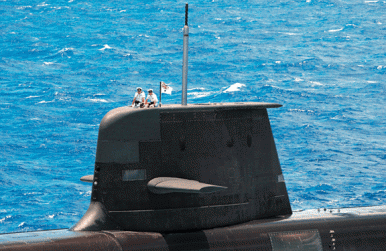A letter outlines why Sweden feels snubbed for not having been invited to bid for Canberra’s new submarine fleet.
Yesterday, Dagens Nyheter, a Swedish daily, published a letter by the head of the Swedish Defense Material Administration criticizing recent statements made by Australian politicians and policymakers that Sweden no longer had the technical expertise to build submarines.
The letter, sent at the beginning of this month to the head of the Australian Defense Material Organization (DMO), which, among other things, manages the acquisition of weapon systems for the Australian military, refutes in detail the justification that was publicly provided why Sweden was not invited to bid for Australia's largest defense procurement program in its history.
Back in February, the Australian Prime Minister, Tony Abbott, ridiculed the SAAB Group’s wish to bid for the contract and argued that, “The last Australian submarine came off the production line in about 2001 … the last Swedish submarine came off the production line in 1996, so it’s almost two decades since Sweden built a submarine.” He also accused Australia’s political opposition of wanting to build a “1960s submarine.”
However, the letter, written by Lena Erixon, the director general of the Swedish Defense Material Administration, notes that, “this is not the case” and emphasizes that Sweden,” maintained a full capacity to design and build submarines both for Sweden and for export over the last 20 years.”
The letter then goes on to outline some the main projects that Stockholm was involved in including, the construction of three Gotland-class submarines – nicknamed “Sweden’s Little Carrier Killer”- four Challenger-class submarines for Singapore, two Soedermanland-class submarines for Sweden, and two Archer-class submarines again for Singapore, between the years 1996 to 2013.
The Australian government is facing severe domestic criticism in how it has been handling the sub replacement program. Among other things, policy makers have time and again provided factually inaccurate statements to the public. In the letter, however, Sweden is particularly attacking the murky and nontransparent bidding process.
“What is most surprising is the exclusion of Sweden from the evaluation process, based on what seems to be inadequate information. At no stage has the DMO requested a detailed briefing about the scope and complexity of the programs recently undertaken by Saab Kockums [a Saab subsidiary] and how these were taken from the design stage to build,” the letter states.
The SAAB group, a Swedish aerospace and defense company, also built Australia’s Collins-class submarines, currently in service in the Australian Navy. According to a report by the Australian Strategic Policy Institute, Australia’s $8.5 billion worth submarine fleet, consisting of six Collins-class submarines, experienced a succession of problems right from the beginning including unreliable diesel engines and an ineffective combat system.
However, the letter states that Sweden’s submarine design capabilities now exceeds that of SAAB’s during the Collins project. It also notes that, “a new design, based on the Collins, would be the path of lowest cost and least risk, and would build on the good work already carried out by Australian industry in the construction and maintenance of Collins.”
The letter, sent at the beginning of this month to the head of the Australian Defense Material Organization (DMO), which, among other things, manages the acquisition of weapon systems for the Australian military, refutes in detail the justification that was publicly provided why Sweden was not invited to bid for Australia's largest defense procurement program in its history.
Back in February, the Australian Prime Minister, Tony Abbott, ridiculed the SAAB Group’s wish to bid for the contract and argued that, “The last Australian submarine came off the production line in about 2001 … the last Swedish submarine came off the production line in 1996, so it’s almost two decades since Sweden built a submarine.” He also accused Australia’s political opposition of wanting to build a “1960s submarine.”
However, the letter, written by Lena Erixon, the director general of the Swedish Defense Material Administration, notes that, “this is not the case” and emphasizes that Sweden,” maintained a full capacity to design and build submarines both for Sweden and for export over the last 20 years.”
The letter then goes on to outline some the main projects that Stockholm was involved in including, the construction of three Gotland-class submarines – nicknamed “Sweden’s Little Carrier Killer”- four Challenger-class submarines for Singapore, two Soedermanland-class submarines for Sweden, and two Archer-class submarines again for Singapore, between the years 1996 to 2013.
The Australian government is facing severe domestic criticism in how it has been handling the sub replacement program. Among other things, policy makers have time and again provided factually inaccurate statements to the public. In the letter, however, Sweden is particularly attacking the murky and nontransparent bidding process.
“What is most surprising is the exclusion of Sweden from the evaluation process, based on what seems to be inadequate information. At no stage has the DMO requested a detailed briefing about the scope and complexity of the programs recently undertaken by Saab Kockums [a Saab subsidiary] and how these were taken from the design stage to build,” the letter states.
The SAAB group, a Swedish aerospace and defense company, also built Australia’s Collins-class submarines, currently in service in the Australian Navy. According to a report by the Australian Strategic Policy Institute, Australia’s $8.5 billion worth submarine fleet, consisting of six Collins-class submarines, experienced a succession of problems right from the beginning including unreliable diesel engines and an ineffective combat system.
However, the letter states that Sweden’s submarine design capabilities now exceeds that of SAAB’s during the Collins project. It also notes that, “a new design, based on the Collins, would be the path of lowest cost and least risk, and would build on the good work already carried out by Australian industry in the construction and maintenance of Collins.”



No comments:
Post a Comment